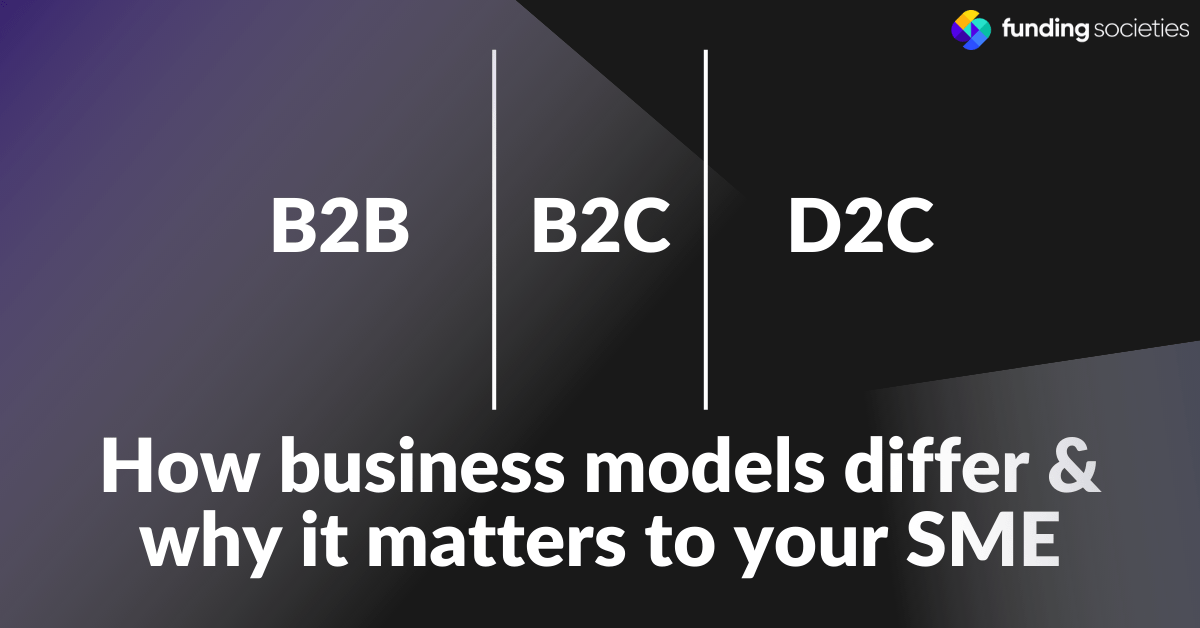Business is an ancient practice that began in the earliest civilizations. Back then, the top commodities produced metalwork and meat. Compared to modern-day business, a lot has changed, from the goods sold in the market to how it’s marketed. The business industry has evolved because sellers can capture opportunities with different profit-making plans. These plans are called business models, and there are varieties of them: B2B, B2C, and D2C. How can a seller determine which one suits their vision best?
First, learn what B2B, B2C, and D2C entail. The good news is that you don’t have to enrol in a business course to find out. Trial and errors are unnecessary, too. As long as you know the end goal of your business, you can create a scalable business model. Let’s dig into it!
What is B2B?
Ever wonder where your favourite shop gets all its products? They may buy their items from another business. Business-to-business or B2B is a well-known business model in which transactions are made from one business to another. Most B2B buyers are retailers and wholesalers who do not produce their own items. Manufacturers will sell the products to buyers at relatively lower prices. After that, the buyers will sell these items at higher prices— considering the costs of distribution, resources, and others—to gain profits.
Most products, such as garments, tools, machinery, and frozen foods, can be sold through the B2B business model. But offering products with complex manufacturing processes would be more advantageous to minimizing your competitor pool. The beauty of B2B is stability; most of your buyers will want to engage in long-term contracts with you. However, challenges like a limited market will be your most formidable foes.
What is B2C?
Compared to the B2B business model, business-to-consumer is a straightforward approach. You can find examples everywhere, from your go-to barbershop to the restaurant you had dinner at last night. E-commerce giants like Amazon and Shopee are also B2C players. It is a model that transfers the products directly to the end users.
In recent years, the popularity of B2C has risen thanks to the vast development of online shopping platforms. According to a report from Precedence Research, the B2C e-commerce market size has hit a value of US$3.86 trillion in 2021. The number is projected to reach US$7.45 trillion by 2030. The advantages of B2C are basically the downsides of B2B – a wide range of target markets, for instance. Nevertheless, B2C sellers must have quick wits regarding marketing, knowing that many competitors are vying for buyers’ interests.
What is D2C?
D2C is the new kid on the block in terms of business models. In principle, it’s a marriage between B2B and B2C, where sellers take hold of their brands manufacturing, distribution, and marketing. It seems like a one-man show, but this model has taken off as sellers—especially small business owners—can operate their brands freely without middlemen.
A survey from Invesp reports that a third of global customers have shopped directly from D2C businesses. Most customers prefer buying from a D2C business because of its considerably low price, authenticity, and ease of getting good quality products. As for sellers, D2C means more profit and control. Now, who wouldn’t want that?
Fundamental Differences of Each Business Model
Knowing the definition of B2B, B2C, and D2C business models helps you get the big picture of what your venture will become. But if you’re still on the fence about which model is the best for you, read on to see more of the distinctiveness.
Who are the customers?
- B2B: Wholesalers, retailers, companies, institutions, organizations, and schools.
- B2C: Individuals of any profession and walk of life.
- D2C: Everyone, including companies, but primarily end-users.
How can it reach the customers?
- B2B: Online via professional websites, testimonials, referrals, cold calls or emails, and word-of-mouth marketing.
- B2C: Online stores, brick-and-mortar shops, social media ads, websites, and mass media ads.
- D2C: Online channels (websites, social media), brick-and-mortar shops, endorsements, reviews, and testimonials.
Technology allows business models to evolve. All three models can reach their target markets online, although with different tones of voice. Pick and fully understand your business model to optimize your approach.
Read from original article here.










